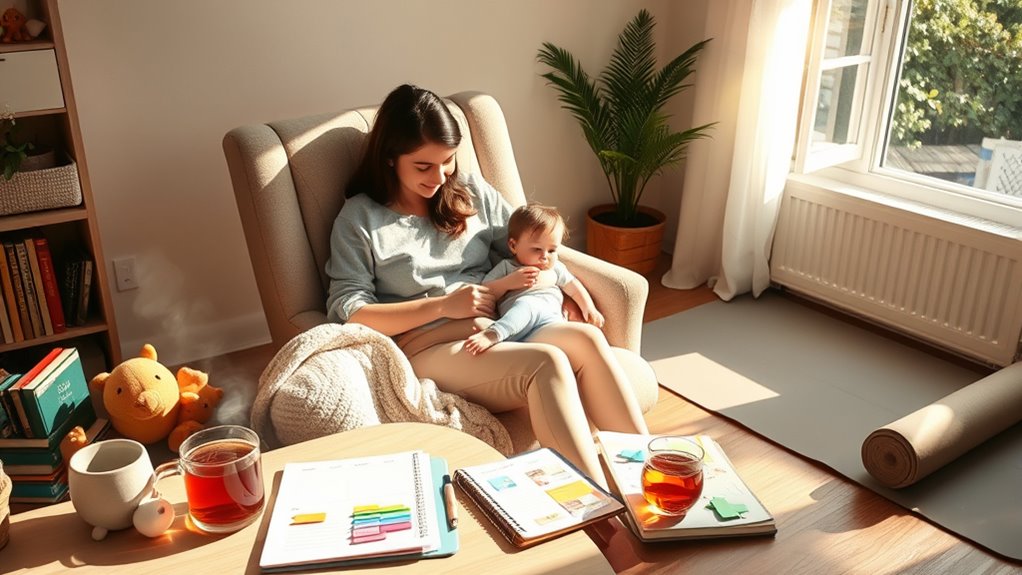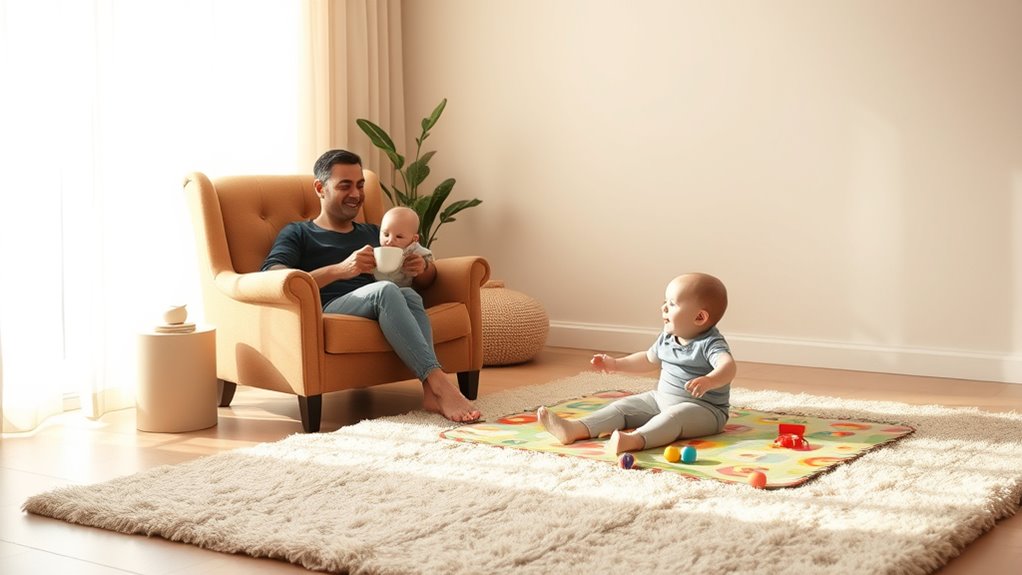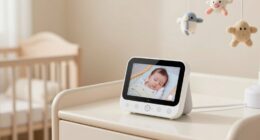Balancing self-care and baby care is essential for your emotional well-being and parenting effectiveness. Make time for regular exercise, prioritize sleep, and practice mindfulness techniques to recharge your energy. Don’t feel guilty for needing personal time; even short moments of self-care can have a positive impact. Build a support network to share responsibilities and reduce stress. By nurturing yourself, you create a healthier family dynamic. Discover more about effective strategies to maintain this balance.
Key Takeaways
- Schedule brief self-care moments throughout the day, such as deep breathing or quick stretches, to recharge while caring for your baby.
- Prioritize sleep and nutrition to maintain emotional stability, ensuring you have the energy for both self-care and parenting demands.
- Involve your baby in gentle activities, like yoga or walks, to bond while also prioritizing your own physical health.
- Set clear boundaries with family and friends, communicating your self-care needs to receive the support necessary for both you and your baby.
- Model self-care practices for your child, helping them learn the importance of emotional well-being from an early age.
The Importance of Self-Care for Parents

While parenting can be incredibly rewarding, it often demands so much of your time and energy that self-care takes a back seat. However, prioritizing self-care isn’t selfish; it’s essential for your mental and physical health. Engaging in practices that enhance holistic approaches to health can significantly boost your well-being. Studies show that regular self-care can improve emotional well-being, making it easier to manage the stress of parenting. Additionally, incorporating mindfulness practices into your routine can help reduce anxiety and promote emotional balance.
When you take care of yourself, you strengthen your emotional resilience, making it easier to handle the challenges of parenting. You also model healthy habits for your children, teaching them the importance of self-care.
Plus, when you’re feeling good, your relationships with family members improve, creating a harmonious environment. Remember, neglecting your needs increases the risk of burnout, which can affect your parenting skills. Moreover, seeking professional help can provide valuable strategies for managing stress and improving your overall well-being.
Practical Strategies to Incorporate Self-Care

Incorporating self-care into your daily routine can feel challenging, especially with the demands of parenting, but it’s essential for your well-being.
Start by scheduling regular exercise, like brisk walks or yoga, to boost your energy and mood. Prioritize sleep, ensuring you get restful nights to recharge, as adequate nutrition is also vital for maintaining emotional well-being. Engaging in gentle stretches or short activities with your child, such as strolls with the stroller, can also foster bonding while promoting physical health. Establishing a consistent sleep routine can significantly enhance your baby’s sleep quality.
Focus on healthy meals and snacks to maintain your energy levels, and remember to hydrate throughout the day. For emotional care, practice mindfulness techniques like deep breathing or meditation. Additionally, consider seeking advice from pediatric sleep specialists to improve your sleep quality.
Set boundaries to manage stress, and carve out time for hobbies that bring you joy, ensuring you cultivate a balanced, fulfilling lifestyle.
Overcoming Common Barriers to Self-Care

How can you prioritize self-care when juggling the demands of a newborn? First, recognize that feeling guilty for needing time for yourself is common, but it’s not selfish—it’s essential.
Carve out small moments for self-care amidst your busy schedule. Even a quick shower or a few minutes of deep breathing can make a difference. If sleep deprivation is overwhelming, consider short naps when your baby sleeps. Additionally, taking care of your sexual health risks can help ensure that you are in a better state of mind and body for parenting. Engaging in digital literacy programs can also provide you with opportunities for playful communication that can lighten your mood. Practicing mindfulness techniques can help block internal chatter and external distractions, allowing you to be more present with your baby.
Finding small moments for self-care, like a quick shower or deep breathing, can significantly impact your well-being.
Don’t hesitate to accept help from trusted friends or family; this can provide you with valuable breaks. Financial constraints? Look for low-cost or free self-care activities, like walks in nature.
Additionally, engaging in mindfulness practices can significantly enhance your mental health and overall parenting experience.
Finally, remember that prioritizing your mental health not only benefits you but also enhances your parenting.
Building a Support Network for Effective Self-Care

Building a support network is essential for effective self-care, especially during the demanding early days of parenthood. Reach out early to friends, family, and online or in-person groups to create connections before your baby arrives.
Be specific about your support needs; this helps others understand how they can assist you. Establish boundaries to maintain healthy relationships and reduce stress. Additionally, creating a safe and comfortable home environment for both you and your baby can significantly enhance your overall well-being, as a supportive atmosphere fosters emotional stability.
Incorporate diverse sources of support, combining practical help like meal delivery with emotional support from peers. Don’t hesitate to seek professional guidance from therapists, doulas, or lactation consultants when needed.
Engaging with community resources can also provide valuable assistance, enhancing your parenting experience while fostering a sense of belonging and reducing feelings of isolation. Additionally, consider connecting with local co-parenting groups to share experiences and gain insights from others in similar situations.
Time Management Tips for Busy Parents

As you navigate the busy world of parenting, mastering time management can make all the difference in balancing your responsibilities and carving out moments for self-care.
Start by prioritizing tasks to focus on what truly matters, ensuring family time isn’t sacrificed. Establish a routine to create predictability in your day, and use shared calendars to keep everyone on the same page.
Try time blocking to dedicate specific periods for tasks, minimizing distractions. Delegate chores to family members, and batch similar tasks to streamline your efforts.
Don’t forget to utilize technology—set reminders, use apps for organization, and consider automated services for shopping.
Finally, allocate time for self-care to maintain your well-being amidst the chaos.
The Role of Mindfulness in Parenting

Effective time management not only helps you juggle your responsibilities but also opens the door to practices that enhance your parenting experience.
Mindfulness can greatly reduce your parenting stress, leading to better emotional regulation and more effective interactions with your child. By focusing on the present moment, you become more responsive and less overwhelmed, fostering healthier communication.
Mindfulness reduces parenting stress, enhancing emotional regulation and fostering healthier communication with your child.
Mindful practices encourage nonjudgmental acceptance of yourself and your child, promoting balanced parenting. As you cultivate mindfulness, you enhance your emotional control, creating a nurturing environment that supports your mental health. Additionally, incorporating growth mindset techniques can help you embrace the challenges of parenting and view them as opportunities for personal development.
This ultimately benefits your child’s development, strengthening your bond and fostering secure attachment. Prioritizing mindfulness enriches your parenting journey and helps you thrive amidst the challenges.
Setting Boundaries for Personal Well-Being

While parenting brings immense joy, it also requires you to maintain personal boundaries to guarantee your well-being. Setting clear limits not only protects your emotional health but also fosters respect and understanding within your family. Extended separations can lead to emotional disconnection, which underscores the importance of maintaining close connections while balancing parenting responsibilities. Additionally, processing loss can be a crucial aspect to consider when navigating emotional challenges in parenting. This balance is essential for fostering secure attachment bonds that contribute to a nurturing environment.
When you communicate your boundaries directly and frame them positively, you encourage others to respect them. Remember, it’s crucial to be patient as you navigate this process; changing behaviors takes time.
Prioritize your self-care activities and recognize your limits to secure emotional stability. Role modeling healthy boundaries teaches your children the importance of respecting others’ needs. Additionally, engaging in activities that promote self-fulfillment can enhance your overall well-being and resilience during parenting challenges.
The Impact of Self-Care on Family Dynamics

Self-care plays an essential role in shaping family dynamics, especially since it directly affects how you interact with your loved ones. When you prioritize your well-being, it fosters positive relationships and enhances communication within your family.
By practicing self-care, you not only manage stress better but also model healthy behaviors for your children, promoting a supportive family culture. This, in turn, strengthens family bonds through mutual understanding and respect. Additionally, understanding community support resources can provide further assistance in your self-care journey. Engaging in spiritual retreats can also offer rejuvenating experiences that enhance your overall well-being.
As you maintain good mental health, you’re more patient and engaged, creating a nurturing environment where everyone feels heard. Additionally, engaging in mindfulness practices can further enhance your self-awareness and emotional regulation, leading to a more harmonious family life.
Encouraging Children to Embrace Self-Care

Encouraging children to embrace self-care is essential for their development and well-being, as it lays the foundation for healthy habits that last a lifetime.
When you introduce self-care early, kids learn to identify and address their physical and emotional needs, reducing the risk of anxiety and depression. Engage them in mindfulness exercises or creative activities like drawing to support emotional regulation and stress management.
By modeling your self-care routines, you show them the importance of maintaining mental and physical health. Establish dedicated spaces for relaxation at home and promote good sleep and eating habits.
These practices enhance resilience, boost energy, and improve overall well-being, making it easier for them to cope with life’s challenges.
Frequently Asked Questions
How Can I Find Time for Self-Care With a Newborn?
Finding time for self-care with a newborn can be challenging, but it’s essential.
Start by adjusting your expectations about daily tasks. Use your baby’s nap times wisely for quick self-care activities, like a short walk or a moment to relax.
Don’t hesitate to lean on family and friends for support.
Prioritize your needs, and remember, taking care of yourself helps you be a more present and engaged parent. You deserve that time!
What Are Some Quick Self-Care Activities for Busy Parents?
You might think you need a whole day at a spa to recharge, but you don’t! Quick self-care activities can work wonders.
Try deep breathing exercises to center yourself, or indulge in a brief walk to refresh your mind. Scalp massages can melt away tension, while doodling or journaling allows your thoughts to flow freely.
A power nap? Yes, please! Even savoring a favorite drink can transform your day.
You’ve got this!
How Do I Communicate My Self-Care Needs to My Partner?
To communicate your self-care needs to your partner, choose a calm moment to express yourself honestly.
Use “I statements” to share your feelings, like “I need some time for myself,” which reduces defensiveness.
Highlight how meeting these needs benefits both of you and encourages mutual support.
Listen actively to their perspective and validate their emotions.
Can Self-Care Practices Include My Baby or Child?
Sure, you can totally include your baby in self-care—because who wouldn’t want to juggle yoga poses while trying not to trip over a wiggly little human?
Seriously though, baby-friendly workouts like stroller strides or yoga can be fun.
Even bath time can be a zen moment with some mindfulness.
Just remember, self-care isn’t selfish; it’s about keeping you both happy.
What Are Signs That I Need to Prioritize Self-Care Now?
If you’re feeling constantly fatigued or notice mood swings, it’s a sign you need to prioritize self-care.
Pay attention to physical symptoms like headaches or lack of energy; these can indicate stress.
If you find yourself withdrawing from social interactions or feel overwhelmed by daily tasks, it’s essential to take a step back.
Recognizing these signs early can help you regain balance and improve your overall well-being.
Don’t ignore your needs!
Conclusion
Incorporating self-care into your routine isn’t just a luxury; it’s a necessity that benefits both you and your baby. By prioritizing your well-being, you’re setting a positive example for your little one. Remember, you can’t pour from an empty cup! So, take those moments for yourself, whether it’s a quick breather or a chat with a friend. You’ll find that a little self-love goes a long way in creating a happier, healthier family dynamic.








